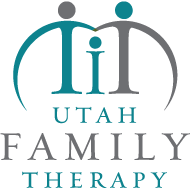Cognitive Behavioral Therapy's (CBT) Role in Promoting Healing at Utah Family Therapy
In mental health treatment, Cognitive Behavioral Therapy (CBT) stands as a cornerstone, offering individuals practical tools and strategies to navigate their thoughts, emotions, and behaviors.
At Utah Family Therapy, CBT is a foundational approach to promoting healing within our outpatient clinic.
In this comprehensive exploration, we delve into the essence of CBT, its principles, techniques, and transformative impact within the context of Utah Family Therapy’s practice.

Quick Links
Understanding Cognitive Behavioral Therapy
CBT is a psychotherapeutic approach grounded in the premise that our thoughts, feelings, and behaviors are interconnected and influence each other.
It operates on the fundamental belief that individuals can alleviate distress and enhance their well-being by identifying and modifying maladaptive thought patterns and behaviors.
The collaborative nature of CBT empowers clients to actively participate in their healing journey, fostering a sense of agency and self-efficacy.
Core Principles of CBT
At the heart of CBT lie several core principles that guide its application:
1. Cognitive Restructuring
Central to CBT is the process of cognitive restructuring, which involves identifying and challenging the disconnective negative or irrational thoughts and replacing them with more balanced and realistic alternatives.
By reframing distorted thinking patterns, individuals can experience a shift in their perception of themselves, others, and the world around them.
2. Behavioral Activation
Through behavioral activation techniques, which promote positive mood and well-being, clients gradually reintegrate enjoyable and meaningful activities into their daily lives, breaking the cycle of avoidance and withdrawal often associated with mental health disorders.
3. Skill Building
CBT equips individuals with coping skills and connective strategies to manage stress, regulate emotions, and solve problems effectively.
From relaxation techniques to assertiveness training, these skills empower clients to navigate challenging situations with confidence and resilience.
4. Collaborative Approach
Therapeutic collaboration lies at the core of CBT, with therapists and clients working together as equal partners in the healing process.
Through open dialogue, mutual respect, and shared decision-making, clients feel empowered to actively engage in treatment and take ownership of their recovery.
Utah Family Therapy's Integration of CBT
Utah Family Therapy embraces CBT as one of the cornerstones of our therapeutic approach, integrating its principles and techniques into its comprehensive treatment model.
Within our mental health outpatient clinic, CBT serves as a versatile tool that addresses a wide range of concerns, including anxiety disorders, depression, trauma-related symptoms, and relationship issues.
Tailored Treatment Plans
At Utah Family Therapy, each client receives a personalized treatment plan tailored to their unique needs and goals.
Through comprehensive assessment and collaborative goal-setting, therapists work closely with clients to identify target areas for intervention and develop a roadmap for healing.
Evidence-Based Interventions
Drawing from the latest research in psychology, Utah Family Therapy incorporates evidence-based interventions rooted in CBT principles.
From cognitive restructuring exercises to behavioral experiments, therapists utilize diverse techniques to help clients challenge negative thought patterns, modify maladaptive behaviors, and cultivate healthier coping mechanisms.
Family-Centered Approach
Recognizing the interconnectedness of family dynamics and individual well-being, Utah Family Therapy adopts a family-centered approach to treatment.
When possible, CBT techniques are often employed within the context of family therapy sessions, allowing clients to explore and address relational patterns that may contribute to their presenting concerns.
Holistic Healing
Utah Family Therapy adopts a mind, body, and spirit approach to healing, considering their interconnectedness.
In addition to traditional CBT techniques, therapists may integrate complementary modalities such as mindfulness-based interventions, expressive arts therapy, and somatic experiencing to promote holistic well-being.
Empowering Clients
Central to Utah Family Therapy’s mission is to enable clients to become active agents in their healing journey without feeling shame or judgement from their past challenges.
Through education, skill-building, and ongoing support, therapists would allow clients to develop the tools and strategies to navigate life’s challenges with resilience and self-confidence.
Measuring Progress
Utah Family Therapy strongly emphasizes measuring treatment outcomes and tracking client progress.
Using standardized assessment tools and regular progress reviews, therapists monitor the effectiveness of CBT interventions and make adjustments to ensure optimal outcomes.
Summary
In conclusion, Cognitive Behavioral Therapy (CBT) serves as one of Utah Family Therapy’s treatment modalities of healing within our mental health outpatient clinic.
By integrating CBT’s core principles and techniques into our comprehensive treatment model, Utah Family Therapy empowers clients to challenge negative thought patterns, modify maladaptive behaviors, and cultivate healthier coping mechanisms.
Through personalized treatment plans, evidence-based interventions, and a holistic approach to healing, Utah Family Therapy fosters resilience, empowerment, and lasting positive change in the lives of its clients.
Action Steps
Here are 10 action steps for individuals interested in incorporating Cognitive Behavioral Therapy (CBT) principles into your life:
Self-Assessment
Reflect on your thoughts, feelings, and behaviors.
Identify any patterns of negative thinking or maladaptive behaviors contributing to distress or dissatisfaction in your life.
Educate Yourself
Learn more about CBT principles and techniques through books, online resources, or workshops.
Gain a deeper understanding of how thoughts, emotions, and behaviors are interconnected and how they influence your mental well-being.
Set Clear Goals:
Define specific and achievable goals for yourself, focusing on areas where you want to see improvement or change.
Break down larger goals into smaller, manageable steps to increase motivation and momentum.
Practice Mindfulness
Cultivate mindfulness practices such as meditation, deep breathing exercises, or mindful awareness of the present moment.
Mindfulness can help you become more aware of your thoughts and feelings, allowing you to respond more skillfully to challenges.
Challenge Negative Thoughts
Begin challenging negative or distorted thoughts by examining the evidence for and against them.
Ask yourself if there’s a more balanced or realistic way to interpret the situation, and consider alternative perspectives.
Behavioral Activation
Engage in activities that bring joy, fulfillment, and a sense of accomplishment.
List enjoyable activities on paper and schedule them into your daily or weekly routine, even when you don’t feel like it.
Keep a Journal
Start a journal to track your thoughts, emotions, and behaviors.
Use it as a tool for self-reflection and problem-solving, noting any patterns or triggers that arise.
Seek Support
Reach out to friends, family members, anxiety support groups or a therapist for support and encouragement.
Share your goals and challenges with trusted individuals who can offer guidance, accountability, and perspective.
Practice Self-Compassion
Be kind and compassionate to yourself, especially during difficult times.
Treat yourself with the same understanding and empathy you would offer to a close friend facing similar struggles.
Stay Consistent and Persistent
Remember that change takes time and effort.
Stay committed to practicing CBT techniques consistently, even when progress feels slow or setbacks occur.
Celebrate your successes along the way and stay focused on your long-term goals.
By implementing these action items and integrating CBT principles into your daily life, you can cultivate greater self-awareness, resilience, and well-being.
